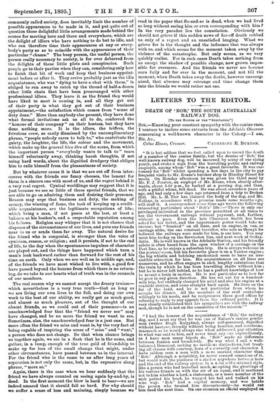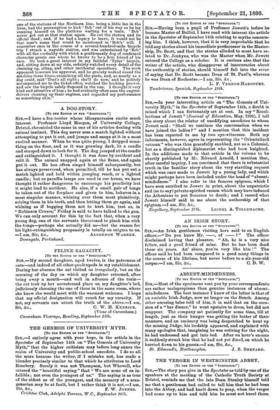LETTERS TO THE EDITOR.
DEATH OF BOB,' THE SOUTH AUSTRALIAN RAILWAY DOG.
[To THE EDITOR OT THE " SPECTATOR."] SIR,—Knowing your constant sympathy with the canine race, I venture to inclose some extracts from the Adelaide Observer concerning a well-known character in the Colony.—I am, Sir, &c., "It is but seldom that we feel called upon to record the death of a member of the canine family, but the demise of 'Bob,' the
well-known railway dog, will be mourned by many of our rising
youth, and evoke a sigh from the travelling public and railway employes, among whom ` Bob ' was a great favourite. It was cus- tomary for ' Bob ' whilst spending a few days in the city to pay frequent visits to Mr. Evans's butcher shop in Hindley Street for meals. On Monday afternoon he was given his third meal by Mr. F. J. Preston, an employe of Mr. Evans, when shortly after- wards, about 3.10 p.m., he barked at a passing dog, and then, with a pitiful whine, fell dead. He was about seventeen years of age, and had only a few days ago returned from a trip to Broken Hill. Mr. L. M. Tier has claimed the body of the dog, and Mr. Nathan, in accordance with a promise made some months ago, will stuff it. A correspondent some time ago wrote the following interesting particulars about ' Bob's ' life :—` There is only one privileged individual in the province permitted at all times to use the Government railways without payment, and, further, without a pass. Even the late Chairman Smith has been asked for his ticket, and the importunate porter would take no excuse; but "franked" on all lines, and on engine, in van, or carriage alike, the one constant traveller, who acts as though he believed the railways were made for him, is our hero. You may meet him to-clay on the Serviceton line, and next week at Oodna- datia. He is well known in the Adelaide Station, and his friendly salute is often heard from the open window of a carriage on the Port line, as he enjoys a suburban trip. He is always welcome in the p)rters'-room, but his favourite place is on a Yankee engine ; the big whistle and belching smokestack seem to have an irre- sistible attraction for him. His acquaintances on all lines are numerous, and he often engages in such lengthy salutations that the train by which he has been travelling starts without him ; but he is never left behind, as he has a perfect knowledge of how to mount a train in motion. He is not particular as to how far he goes in any given direction. He has set out for a hundred- mile trip, but suddenly changed his mind and also his engine at a roadside station, and come straight back again. He lives on the fat cf the land, and he is not particular from whom he accepts his dinner. All the members of the staff contribute willingly to his needs, and he reciprocates these good offices by refusing to reply to any appeals from the ordinary public. It is very clearly established that his sympathies are with the railway men, though he is not on the committee of the mission.'" "I had the honour of the acquaintance of 'Bob,' the railway dog, and I must say that he was cne of Nature's canine gentle- men (writes Hugh Ealyptus), always self-possessed, dignified courteous, on without hauteur, friendly without being familiar, and coutreten inasmuch as he would always rise when addressed, pay at to what was said to him, and never treat any ems superciliously, as I have seen many bipeds do. ` Bob ' made no difference between fustian and broadcloth. He was what I call a well- balancel Democrat, making no invidious distinctions, but treat- ing all classes with courtesy, born of a correctly cast character. I have seldom seen a man with a mcre marked character than 'Bob.' Although a notability, he never seemed conscious of it,
but would walk the platform of a stat anywhere betwett here
and the end of the railway system in a c self-c:Aatained style, like a person who had travelled much, acepting the greetings of his various friends as with the air of an equal, and it 'mattered not to him whether a lord, a statesman, or a mere member of the mob patted his head, he wagged his tail and walked on his wise way. 'Bob' had a capital memory, and woe betide the person who treated him discourteously—he would out him dead the next time. On one occasion an official employed on one of the stations of the Northern line, being a little lax in the liver, had the presumption to kick Bob' out of his way as he lay sunning himself on the platform waiting for a train. ' Bob ' never got out at that station again. He cut the station and its official dead ; and, if he had a legacy to leave, it would not be that man's name that would be mentioned in • Bob's' will. I remember once in the course of a several-hundred-mile bicycle trip I struck a wayside station, and was entertained by 'Bob' with all the cordiality with which a gentlemanly dog of confirmed character greets one whom he knows to be a firm friend of his race. He took a great interest in my faithful ' Tyler ' bicycle, and, sitting down at my side, sedately watched every detail of the cleaning up, oiling, and other incidental operations. The work appeared to secure his approval, and he gravely walked round the machine three times, examining all the parts, and, as nearly as a dog could, said That's all right ; she'll do now,' and he politely accompanied me to the ticket-office, watched the booking process, and saw the bicycle safely disposed in the van. I thought it very kind and attentive of him ; he had evidently often seen the engine- drivers cleaning up their engines, and regarded my performance as something akin."



































 Previous page
Previous page